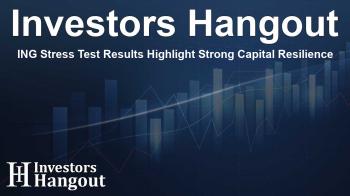ING Stress Test Results Highlight Strong Capital Resilience

EBA Stress Test Outcomes for ING
In a significant development for the banking sector, the European Banking Authority (EBA) has published the results from the 2025 stress test, which assessed the resilience of European banks, including ING. This rigorous evaluation is essential for understanding the capital adequacy of banks under stressful economic conditions.
Understanding the Stress Test Framework
Unlike typical assessments, the 2025 EU-wide stress test doesn't have a pass or fail outcome. Instead, it serves as a vital input for the Supervisory Review and Evaluation Process (SREP), aiding regulatory bodies in evaluating ING's capability to uphold regulatory demands during adverse scenarios.
The Design of the Test
The stress test utilized scenarios projected by both the European Central Bank and the European Systemic Risk Board, forecasting potential economic conditions spanning from 2025 to 2027. Based on a static balance sheet as of December 31, 2024, this test does not predict future financial strategies or management actions.
Key Findings from the Stress Test
As the findings indicate, several key metrics were analyzed, particularly focusing on the Common Equity Tier 1 (CET1) ratios under two scenarios - baseline and adverse.
CET1 Ratio Summary
The outcomes for the CET1 ratios reflect a robust capital position for ING:
- Baseline Scenario (Year-End 2027):
- CET1 Ratio Transitional: 12.90%
- CET1 Ratio Fully-Loaded: 11.85%
- Adverse Scenario (Year-End 2027):
- CET1 Ratio Transitional: 10.63%
- CET1 Ratio Fully-Loaded: 10.41%
ING’s Commitment to Capital Strength
ING's proactive measures include conducting their specific stress tests regularly. Based on these assessments, ING confidently maintains its strong and resilient business model backed by a robust capital framework, citing a CET1 ratio of 13.3% as of June 30, 2025, indicating a buffer above the regulatory requirements.
Long-term Sustainability Initiatives
In line with its strategic objectives, ING emphasizes sustainability in its operations. The bank is continuously evaluated by independent researchers, resulting in a corroborated ESG rating of 'AA'. This rating underscores the commitment of ING to maintaining a strong focus on sustainable practices, aligning with the broader societal shift towards a low-carbon economy.
Additionally, as of June 2025, Sustainalytics viewed ING's management of ESG risks as 'strong', further highlighting its efforts in responsible banking practices.
Continuous Improvement and Challenges Ahead
ING understands the necessity for continuous improvement within its operational framework to meet evolving regulatory standards and societal expectations. The bank recognizes the challenges that lie ahead, including geopolitical factors, changes in economic conditions, and shifts in customer behavior.
Future Outlook for ING
With sustained efforts in analyzing market dynamics and enhancing operational resilience, ING aims to adapt to various challenges while ensuring growth and sustainability in its operations. Understanding customer needs alongside market conditions will play a crucial role in ING's strategic planning and execution going forward.
Frequently Asked Questions
What do the EBA stress test results indicate for ING?
The results highlight ING's resilience and strong capital position, demonstrating its ability to withstand adverse economic conditions.
How does the EBA stress test work?
The EBA stress test evaluates banks without a pass/fail system, instead providing insights for regulatory bodies to assess capital adequacy under various economic scenarios.
What is the CET1 ratio, and why is it important?
The CET1 ratio is a measure of a bank's capital strength, crucial for ensuring that the bank can sustain losses while still meeting regulatory requirements.
How does ING support sustainability?
ING places a high priority on sustainability, receiving independent evaluations confirming its commitment to responsible practices and low-carbon initiatives.
Where can I find more information about ING?
For additional details, please explore ING's official website or their dedicated newsroom for the latest updates.
About The Author
Contact Dominic Sanders privately here. Or send an email with ATTN: Dominic Sanders as the subject to contact@investorshangout.com.
About Investors Hangout
Investors Hangout is a leading online stock forum for financial discussion and learning, offering a wide range of free tools and resources. It draws in traders of all levels, who exchange market knowledge, investigate trading tactics, and keep an eye on industry developments in real time. Featuring financial articles, stock message boards, quotes, charts, company profiles, and live news updates. Through cooperative learning and a wealth of informational resources, it helps users from novices creating their first portfolios to experts honing their techniques. Join Investors Hangout today: https://investorshangout.com/
The content of this article is based on factual, publicly available information and does not represent legal, financial, or investment advice. Investors Hangout does not offer financial advice, and the author is not a licensed financial advisor. Consult a qualified advisor before making any financial or investment decisions based on this article. This article should not be considered advice to purchase, sell, or hold any securities or other investments. If any of the material provided here is inaccurate, please contact us for corrections.

